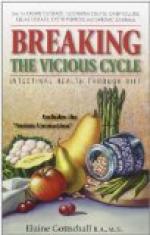[Sidenote: Some Word]
Third: The tissues of animals contain excrementitious material, which may cause excess acidity, raise the blood pressure, and so forth.
Fourth: More apt to putrefy and thus give ptomaine poisoning.
Fifth: Makes the disposition more vicious.
(Honest,—animals eating meat exclusively are more vicious.)
[Sidenote: The Affirmative Side]
Those who believe that animal protein should be eaten answer these points as follows:
First: Survival of the fittest.
Second: If you give decent support to your health departments they can furnish enough inspectors to prevent the marketing of diseased meat; and if some should slip through, if you thoroughly bake, boil, or fry your animal parasites they will lose their pep.
Third: Most of the harmful products are destroyed by the intestines and liver.
Fourth: True, but see that you get good meat, and don’t eat it in excess.
Fifth: Unanswerable—to be proved later by personal experiments.
In addition, they say that animal protein is more easily digested, that 97 per cent is assimilated because it is animal, and so it is much more to be desired, especially by children and convalescents; that vegetable protein is enclosed in cellulose, and only 65 to 75 per cent is used by the system; thus the diet is apt to be too bulky if the proper amount is taken.
[Sidenote: Strong Vegetarians]
It has been proved, however, by several endurance tests, that the vegetarian contestants had more strength and greater endurance than their meat-eating competitors, so there is no reason why we should be worried by one or two, or even more, meatless days, especially when animal product protein, such as milk, eggs, cheese, and the vegetable proteins, as in the legumes and the nuts, are available.
[Sidenote: A Confession]
I confess that for quite a while after studying vegetarian books I took a dislike to meat, but now I am in the comfortable state described by Benjamin Franklin in his autobiography. It seems that he had been converted to vegetarianism and had decided that he never again would eat the flesh of animals that had been ruthlessly slaughtered, when they so little deserved that fate.
But he was exceedingly fond of fish, and while on a fishing party, as some fish were being fried, he found they did smell most admirably well, and he was greatly torn between his desire and his principle. Finally he remembered that when the fish were opened he saw some smaller fish in their stomachs, and he decided that if they could eat each other he could eat them.
[Sidenote: Most Noted Picture of B. Franklin Extant]
Protein Calories in 100 C Portions of Food




